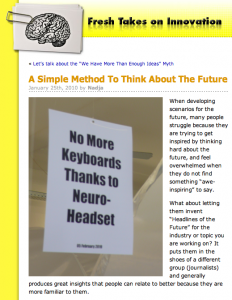My friends Rory and Anita at The Creativity Hub are pretty much the nicest people I know. That’s not entirely surprising considering the work they do in creativity and conflict resolution. I know Rory from a few years ago when he was working in the rehabilitation of prisoners (from our unique political ‘situation’) and I was very glad to re-acquaint myself with him not long after the start of this job – both for work and socially.
Rory introduced me to the concept of “Advanced Civilisation” (which he said is also available on the Internet as Beachhead). It’s something I had used for my creative writing but I had not really considered using it for work-related purposes. I do find now that I use it a lot – that imagination figures heavily in how I want to enact change in the world around me. The secret to achieving things lies in the discovery of great people, not in the funding programmes that are available.
This weekend we will complete the proposal document for StartVI year two and we will be looking for 6 great start-up ideas. We have a much more cohesive programme planned for the 2011 intake, more mentors and a better idea of what can be achieved now that we’ve shown it can work.
I’m also proposing the founding of a new co-working, research based technology centre in Belfast. And a solution to improving the quality of software engineering in Northern Ireland – comprising of a industry-tailored education programme and a community focused technology freeschool. Of course I alone am not qualified to do all of this. That’s why I’ve been looking for great people to help change the world; to steal the future; to get there earlier.
All of this to create a hub of 21st Century Enlightenment.
